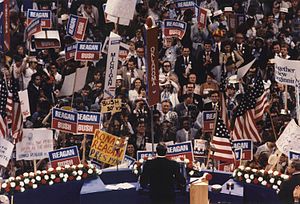- Convention bounce
-
 Ronald Reagan addresses the 1980 GOP convention. Reagan saw a big boost in the polls after his acceptance speech, but his opponent, President Jimmy Carter, got an equally large bump after his convention four weeks later.
Ronald Reagan addresses the 1980 GOP convention. Reagan saw a big boost in the polls after his acceptance speech, but his opponent, President Jimmy Carter, got an equally large bump after his convention four weeks later.
A convention bounce or convention bump refers to a surge of support that U.S. presidential candidates in the Republican or Democratic party typically enjoy after the televised national convention of their party.[1] A presumptive nominee for president may also be said to experience a "VP bounce" after announcing his pick for vice president prior to the convention. The size and impact of convention bumps vary, but presidential candidates usually see at least a small uptick in their polling numbers coming out of their conventions.[2]
History of convention bounces
Bill Clinton benefited from one of the largest bumps in history after the Democratic National Convention in 1992, climbing by as many as 30 points in the polls[3], though that was due in part to independent candidate Ross Perot's decision to drop out and endorse Clinton during the convention. Then-President George H.W. Bush's convention bounce was weak by comparison, some party leaders blaming former primary challenger Pat Buchanan's fiery and divisive speech, which aired in primetime due to a scheduling delay. Four years later, Bob Dole got a big bounce after the Republican convention, but quickly fizzled. However, Al Gore's 2000 bounce endured for weeks. Prior to the Democratic convention, Gore was behind Texas Gov. George W. Bush by as many as 16 points, but was in a statistical tie with the Republican the weekend after his acceptance speech. To the bafflement of political pundits, Democratic candidate John Kerry did not get a convention bounce in 2004[4], despite the unpopularity of incumbent George W. Bush.
Polls indicated a small bounce for 2008 Democratic presidential nominee Barack Obama after his party's convention in August[5], but as expected, much of it evaporated during and after the Republican convention the week following, yielding GOP candidate John McCain a small lead in several polls.[6][7] Nielsen ratings revealed that year's party conventions to be the most-watched ever, with the Republican convention narrowly trumping the Democrats'.[8]
References
- ^ "U.S. Elections Glossary & Terms". All American Patriots. 2004-9. http://www.allamericanpatriots.com/elections_u_s_elections_glossary_terms. Retrieved 2009-06-20.
- ^ Tom Holbrook: Convention Bumps
- ^ AP: Post-convention bounce averages 10 points
- ^ CBS News: No Bounce for Kerry
- ^ Politico: Obama's bounce smaller than others
- ^ Gallup: McCain’s Bounce Gives Him 5-Point Lead
- ^ USA Today Poll: Convention lifts McCain over Obama
- ^ Associated Press: McCain, Obama tied in TV audiences

This article about a political term is a stub. You can help Wikipedia by expanding it.
